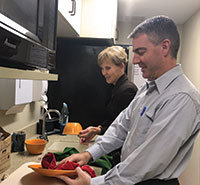 Laura Carlson and Brian Flaherty wash dishes in the Graduate School office kitchen.
Laura Carlson and Brian Flaherty wash dishes in the Graduate School office kitchen.
With a kitchen renovation in the works for the Graduate School offices on the fifth floor of the Main Building, Dean Laura Carlson saw an opportunity for change. Now that the kitchen had a sink, why not switch to reusable dishes for meals and snacks, rather than disposable paper and plastic? That raised some immediate questions among staff — like who would wash the dishes?
Carlson made sure rules and expectations were set early on, including a zero-tolerance policy for dirty dishes in the kitchen — if you use a dish, wash it. If you’re unable to do so immediately, leave the dish at your desk until you have time. On the rare occasion that a dirty dish is left in the sink, an email is sent out almost immediately as a gentle reminder. For larger lunches that the office hosts, a few individuals will volunteer to wash and dry, including Carlson. “How can you ask others to make a change if you’re not willing to make the change yourself?” she says.
For a time, paper products kept appearing even though the office wasn’t purchasing them.
The cause? The items were left behind from catered events. The office now asks caterers not to bring any paper products or disposable utensils to events.
The switch to dishwashing also created opportunities for enhanced communication — you have different conversations with people standing in the kitchen washing dishes than you do at a meeting. Now, plates and bowls are easily accessible and paper products are hidden away, encouraging sustainable behavior. The same principle is applied to recycling in the office. By hiding the kitchen trash can from plain sight, recycling is now the easier choice. For other offices interested in increasing sustainable practices, the keys are to start small, establish new norms and shift the culture.
“Motivate people by what matters to them most,” says Brian Flaherty, director of budget and operations for the Graduate School. For some staff members this means emphasizing the environmental impact, for others the social impact or monetary effect. “Not everyone is going to agree with you from the start, but you can find a way to connect them to the change.” While washing dishes might not be practical for every office situation, we can all find ways to contribute to sustainability efforts on campus. For more information about green office strategies, contact the Office of Sustainability, 631-2748 or green@nd.edu.
Originally published by at news.nd.edu on February 27, 2017.